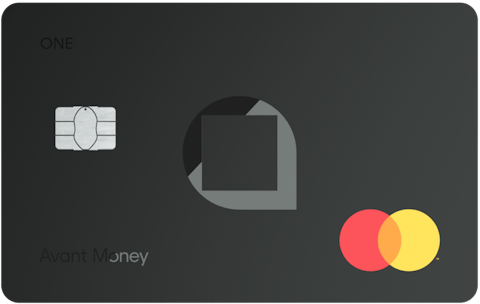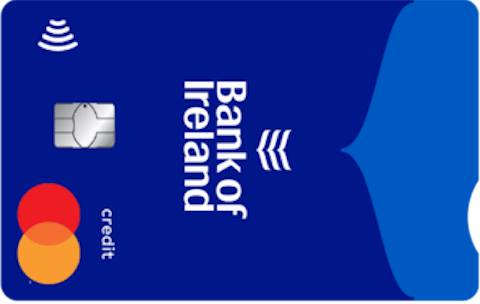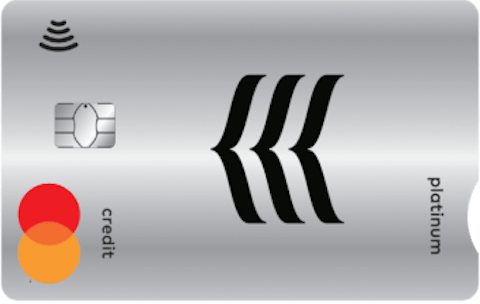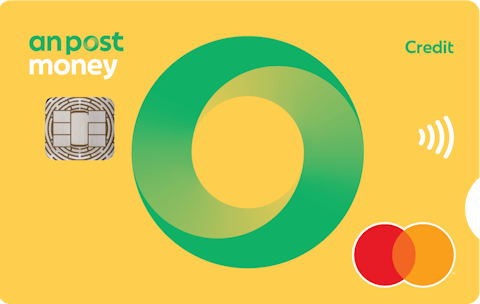A balance transfer card can reduce the amount of interest you pay on your credit card balances. The best balance transfer cards have a long interest free period to give you more time to pay back what you owe.
The longest 0% balance transfer card
The Classic Credit Card from An Post Money offers the longest 0% balance transfer period in Ireland. Its introductory rate runs for 12 months but after that, the rate you’ll pay on balances is 22.9% APR (Annual Percentage Rate).
There are lots of other credit cards on the market, so our experts at creditcards.ie have taken a look at what’s on offer and selected the best of the rest for reducing your credit card balance.
Best alternative balance transfer card

Why we like this card
The Avant Money One Card offers a fresh and more flexible alternative to the traditional balance transfer.
With a 0% money transfer, you can simply transfer funds from your new credit card to your bank account and cover all your finance needs for one year, totally interest free.
What's the difference between a money transfer and balance transfer?
With a balance transfer card you can transfer the debt directly from your existing credit card either by phone or your online account.
If you want to settle your credit card balance with a money transfer, you’ll need to move the money to your current account and use the funds to pay off your credit card debt. However, a money transfer gives you more flexibility and control over your money.
For example, if you get a €5,000 credit limit, you could use up to 95% of it to pay off your existing credit card balance, clear your overdraft and even have a little extra to spend. All interest free for one year.
Pros
- You’ll get a fee free 0% money transfer for 12 months for any purpose
- It offers 0% balance transfers for 9 months & 0% purchases for 3 months
- Enjoy the Avantages® loyalty programme for access to over 300 offers
Cons
- It’s got one of the highest annual percentage rates (APRs) once discount ends
- You’ll need to arrange the transfers between accounts yourself
The bottom line
A great alternative to a balance transfer card. It’s the ideal option for those confident about making credit work for them.
Best all round 0% balance transfer card

Why we like this card
The Classic Credit Card from Bank of Ireland has a great introductory rate for balance transfers and for everyday spending, it’s a popular choice for many.
For large purchases, the Instalment Plan option enables you to transfer your credit card purchase onto a lower rate of 6.7% variable (6.9% APR) and pay the balance in either 6, 12 or 24 equal monthly instalments.
Pros
- It offers a long 0% introductory rate on balance transfers
- You can choose 0% on purchases for 6 months if you don’t need a balance transfer
- There’s a low cost instalment option for larger purchases
Cons
- There are no extra rewards on offer
- You have to choose between 0% on balance transfers or 0% purchases
The bottom line
We like the generous 0% introductory period. The Classic card is the ideal card to help you get your finances back on track and keep future credit costs down.
Lowest interest rate balance transfer card

Why we like this card
The Platinum Advantage has one of the longest balance transfer periods in Ireland and the lowest annual percentage rate (APR) of all the cards we looked at.
If you want to use it for spending, it has a 0% interest rate on purchases for 6 months and reverts to a low standard purchase rate.
Frequent travellers can benefit from free travel insurance, and you’ll get comprehensive multi-trip travel insurance including winter sports if you use your card to pay for at least half of your holiday.
Pros
- It’s got one of the lowest APRs in Ireland once the 0% introductory rate ends
- You’ll move to a low rate on purchases once the introductory rate finishes
- Enjoy free multi-trip travel insurance
Cons
- You’ll need to earn €40,000 per year to qualify
- There’s an annual charge of €76.18 for the card
- To qualify for free insurance, you need to use your card to pay for at least 50% of your trip
The bottom line
If you like to live life to the full and use your credit card for work, rest and play, this is the perfect spending partner.
Your guide to balance transfer cards
Transfer your balance and reduce the cost of borrowing on your credit card.
Using your balance transfer card to save money
A balance transfer card allows you to move existing credit card debt to a new card with lower interest rates.
Many Irish banks offer 0% interest rates on balance transfers for an introductory period of up to 12 months.
By slashing the interest rate you pay, you can reduce your credit card debt more quickly and save money.
Your card in action
If you have a balance of €1,500 on your credit card with an APR of 20% and you pay €125 per month it would take 14 months and cost an extra €188 in interest. A card with a 5% APR would take 13 months and you’d pay €42 in interest but with a 0% APR purchase card, it would take 12 months and cost you €0.
What to look for in a balance transfer card
There’s so many features to compare when you’re thinking about a credit card it’s often difficult to tell which card is best for your needs.
Here’s what to consider when picking a balance transfer card.
- Introductory transfer period - this is the most important factor if you need a long time to pay off an existing balance, or you have a high balance to clear. It’s typically applied for 3, 6, 9 or 12 months in Ireland.
- Introductory interest rate - this is a discounted rate set for a fixed time. The most helpful rate is 0% because you’ll pay no interest at all for the duration of the introductory offer. However, a lower rate, of say 3%, over a longer duration could work out just as well.
- Standard variable interest rate - this is the advertised interest rate your card returns to after the introductory rate has ended. Take this into account if you don’t think you’ll be able to pay off your balance before the introductory period ends.
- Typical APR - this is the official rate used for comparing credit cards and loans and includes the standard rate of interest plus other costs associated with your credit such as Government Stamp Duty or annual fees.
- Bank charges and fees - costs added for things like late payment, cash advances or missed payments. Some premium and rewards cards also charge an annual fee, so check the small print before applying.
- Rewards and cashback - some cards are offered with cashback, travel perks or exclusive discounts but you’ll often have to pay an annual fee or higher interest rate. If you think you’ll benefit from extra perks these cards can be good value, but if you don’t use your card often or travel frequently they’re probably not worth it.
- Salary requirements - most cards require you to have a minimum salary of €16,000 per year, although some premium cards may require €40,000 for approval. The exception to this is credit cards for students.
Benefits you’ll often get with a balance transfer card
Most balance transfer cards will come with these features and benefits.
- 56 days interest-free credit when you pay off your balance in full each month
- No transaction fees when you pay for goods and services in Ireland
- Fraud protection and secure online shopping
- Contactless payments on your mobile with Apple and Google Pay
- Free additional cardholders, often up to 3 extra people
- Low cost instalment plans with low interest for large purchases
What happens when the introductory period ends?
Any balance still outstanding on your credit card at the end of the introductory period will be charged interest at the APR set by your card issuer. This means your monthly repayments will go likely go up or it’ll take longer to pay off your balance.
Aim to use the 0% balance transfer period to pay off your balance in full if you can or move your remaining balance to another balance transfer card to avoid a hike in interest payments.
Are there limits to the amount you can transfer?
The amount you can transfer depends on the credit limit on your new credit card. Generally, most providers allow you to transfer up to 95% of your total credit limit as a balance transfer.
The credit limit is the maximum amount you can borrow on your credit card at any one time and is set by your card issuer.
Using a money transfer to reduce your balance
Credit cards like the Avant One Credit card in Ireland are currently offering 0% money transfers for 12 months.
A money transfer allows you to borrow money from your credit card and transfer it directly into your bank account. If you want, you can use this money to pay off any outstanding credit card debt.
Usually, you’ll have to pay interest on a money transfer so this isn’t the best way of paying off a credit card balance, but the one year 0% interest deal is a deal worth considering if you pay off your debt within 12 months.
The card issuer may set a minimum money transfer amount and limit transfers to a proportion of your credit limit so check before applying.
What other balance transfer cards are on offer?
| Introductory Interest Rate | Typical APR | |
|---|---|---|
| An Post Money Classic Credit Card | 0% for 12 Months | 22.9% |
| Avant Money One Card | 0% for 9 Months | 22.9% |
| Bank of Ireland Platinum Advantage | 0% for 7 Months | 19.6% |
| Bank of Ireland Classic | 0% for 7 Months | 22.1% |
| PTSB ICE Visa Credit Card | 0% for 6 Months | 22.53% |
| Revolut Credit Card | 0% for 3 Months | 17.99% |
| Avant Money Reward+ Card | 0% for 2 Months | 22.9% |
How to get approved for a balance transfer card
To get a balance transfer card in Ireland you may need to do an eligibility check before you apply. But don’t worry, you’ll simply be asked about your income and outgoings and dependants.
If you decide to go ahead with your application, you’ll need to provide documents with personal and financial information and the bank will obtain evidence of your credit history from the Central Credit Register .

Basic lending criteria
Each card provider has different lending criteria, but you usually have to be:
- over 18 years of age
- a pet resident of the Republic of Ireland
- earning over €16,000 per year
Balance transfer FAQs
How do I check my credit card balance?
Your credit card balance will be on your monthly statement. You’ll normally get a monthly statement in the post but some providers like Avant Money and Bank of Ireland can provide e-statements to your registered email. .
What happens when I transfer my balance?
Once your balance has transferred to your new card your old account isn’t automatically closed. If you still have money remaining on your old card you must continue to pay it off.
If you have paid off the balance in full by transferring the debt, it’s your choice whether to close your account and cancel your card.
Can I have more than one balance transfer card?
There is no set limit to the number of balance transfer cards you have, however, for each new credit card application, you make you’ll need to undergo a credit check and meet the lender’s criteria.
You’ll also have to pay the €30 stamp duty charge each year on every credit card account you hold.
Can I apply for balance transfer card with bad credit?
If you have a history of unpaid loans, late payments or a poor credit score, it will make it more difficult to get a credit card.
When you apply for a credit card, the card issuer will access the Central Credit Register Credit to inspect your credit history.
Each bank will have its own criteria for approving credit and some are more stringent than others but alongside your credit record, the bank will also consider your income and outgoings, such as salary, rent and utilities.
Where can I get advice about credit card debt?
If you’re worried about meeting repayments, your level of debt or if you’re experiencing financial difficulties it’s best to talk to your bank or providers. For free, independent and confidential advice contact:
The Money Advice & Budgeting Service via their website or call the MABS Helpline on 0761 07 2000.
